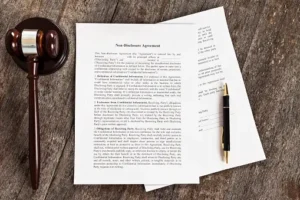On July 24, the Consumer Financial Protection Bureau (CFPB) issued a press release announcing its release of a circular warning companies away from using broad nondisclosure agreements to prevent employees from becoming whistleblowers. It is just the latest example of a key enforcement agency taking affirmative steps to clear the path for whistleblowers, recognizing the critical role they play in helping the government police corporate fraud and misconduct.
The Securities and Exchange Commission (SEC) has been the most aggressive on this front, bringing numerous actions to enforce the agency’s Whistleblower Protection Rule — SEC Rule 21F-17(a) — which broadly prohibits companies from taking any action to impede or discourage whistleblowers. In the past year alone, this included actions against JP Morgan Securities, Monolith Resources, D.E. Shaw & Co., and CBRE, Inc. for requiring employees, clients, or customers to sign agreements that put up roadblocks or flat out prevent them from reporting potential violations to the SEC.
Last month, the Commodity Futures Trading Commission (CFTC) followed suit going after Trafigura Trading for violating the CFTC’s analogous whistleblower protection rule — CFTC Regulation 165.19(b). Specifically, Trafigura required employees to sign employment agreements, and requested that former employees sign separation agreements, with broad nondisclosure provisions that prohibited the sharing of Trafigura’s confidential information with third parties. According to the CFTC, these provisions did not contain carve-out language expressly permitting communications with law enforcement or regulators such as the CFTC.
And last year, the Federal Trade Commission’s (FTC) Bureau of Competition issued guidance cautioning against the use of contractual provisions and confidentiality agreements that get in the way of individuals speaking freely with the FTC, finding them “contrary to public policy and therefore unenforceable.” The FTC pointed to the SEC — along with several other agencies including the National Labor Relations Board, Federal Aviation Administration, and the National Highway Transportation Safety Administration — as having reached the same conclusion.
The CFPB is thus a very good company in taking this newly invigorated stand to protect whistleblowers. And for good reason. Whistleblowers play a critical role in helping the government detect wrongdoing. CFPB Director Rohit Chopra stressed this fact in announcing the agency’s new initiative:
The law enforcement community uncovers serious wrongdoing by financial firms through whistleblower tips. Companies should not censor or muzzle employees through nondisclosure agreements that deter whistleblowers from coming forward to law enforcement.
The need for clearing the way for whistleblowers is even more important these days given the ever-more sophisticated schemes fraudsters are employing to cheat the system and the ever-expanding shroud surrounding our newest developments and technologies. The growing use of Artificial Intelligence offers a prime example. Without a whistleblower-window into how it is used and where it is heading, we will be vulnerable to a rash of potential misuse and corruption of this uniquely formidable and life-as-we-know-it, altering tool.
That is largely what is behind all the news surrounding the SEC complaint by several OpenAI whistleblowers on the company’s severance, non-disparagement, and non-disclosure agreements that allegedly prohibit or discourage whistleblowers from reporting to the SEC. The whistleblowers stressed the especially critical role of whistleblowers in this new area:
Given the risks associated with the advancement of AI, there is an urgent need to ensure that employees working on this technology understand that they can raise complaints or address concerns to federal regulatory or law enforcement authorities. Likewise, it is critical for companies like OpenAI to understand the illegal nature of their NDAs, and to ensure that their workplace cultures encourage employees to raise concerns, even if those concerns are raised directly to federal authorities, and even if those concerns may impact the profitability of the companies.
The CFPB clearly agrees. As does a growing list of our top enforcement agencies. Companies should take heed and make sure they do not get in the way of potential whistleblowers. This means avoiding any provisions in employment and severance agreements that impede or penalize whistleblowers. Companies would be wise to go one step further and include in these agreements provisions that explicitly permit reporting complaints and concerns to the government without any risk of retaliation or reprimand.
If you would like to learn more about the various paths to becoming a whistleblower or have information concerning potential fraud or misconduct, please do not hesitate to contact us. We will connect you with an experienced member of our whistleblower team for a free and confidential consultation.
Read CFPB Joins Chorus Of Government Agencies Clearing The Way For Whistleblowers at constantinecannon.com






Leave A Comment